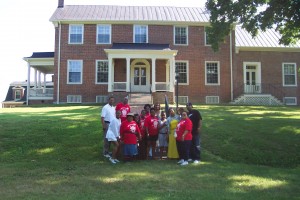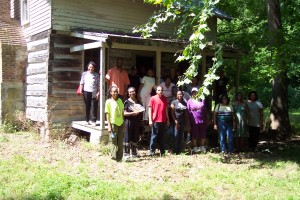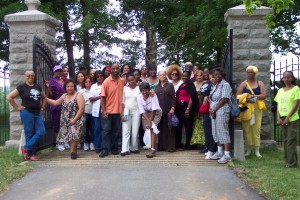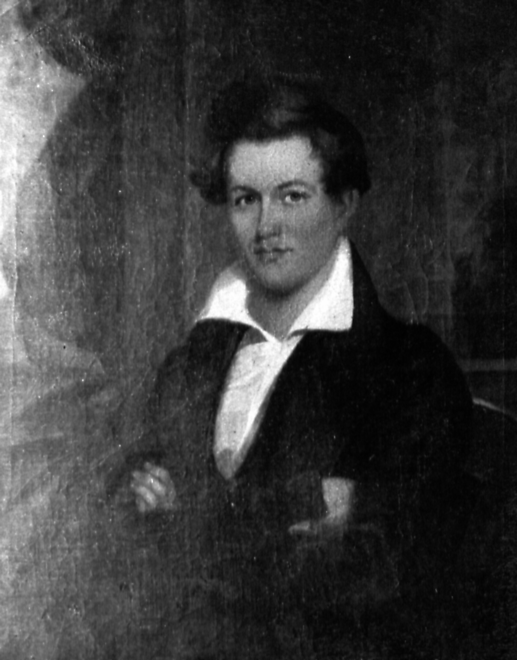June 25th, 2010

Washington Family at Wessyngton Plantation
On June 19th members of the Washington family visited Wessyngton Plantation as part of their family reunion. The tour included a visit to the mansion, Washington family cemetery, and a restored slave cabin. Family members descend from Temperance Washington born 1795, who was enslaved on the plantation along with her son Sam and daughter Jane in 1815. Sam Washington born 1812 married Jane Hadley 1835-1916. After emancipation the Washington family remained in the Cedar Hill, Tennessee area. Members of the family were instrumental in establishing the St. James Baptist Church in Cedar Hill. On June 20th the church celebrated its anniversary where numerous Washington descendants still worship. These members descend from Sam and Jane’s children: Nelson Washington, Irvin Washington, Temperance Washington Sherrod, and Betty Washington Smothers.
Tags: African American History, Cedar Hill Tennessee, Slavery, St. James Baptist Church, Washington family, Washington family reunion, Wessyngton Farms
Posted in Civil War, Genealogy & DNA, Interviews, Introduction & Personal, Plantation Life, Research | Comments Closed
June 13th, 2010

In addition to touring the grounds surrounding the Wessyngton mansion, National Black Arts Festival members and guests walked in the footsteps of Baker’s ancestor in the slave cabin area of the plantation. The group went inside a restored slave cabin built ca. 1830. In 1860, there were 274 enslaved African Americans on the plantation, housed in forty log cabins. At the onset of the Civil War, Wessyngton held the largest African American population in the state of Tennessee and was the largest tobacco producer in America.
Tags: African History, Antebellum Plantation, black history, Civil War, Dr. Collette Hopkins, National Black Arts Festival, plantation slavery, Plantations, Slave cabins, Slave Housing, Slave Labor, Slave Life, Southern Plantation, Tennessee slavery, Wessyngton mansion
Posted in Book Tour & Reviews, Civil War, Current Events, Genealogy & DNA, Interviews, Introduction & Personal, Plantation Life, Research | Comments Closed
June 13th, 2010

Today I had the honor of conducting a study group tour of Wessyngton Plantation for Dr. Collette Hopkins, Director of the National Black Arts Festival of Atlanta, along with a number of her colleagues and distinguished guest. The tour included a visit to the Wessyngton mansion, Washington family cemetery, and a former slave cabin. Participants were told about the lives of enslaved African Americans on the largest tobacco plantation in America and walked in their footsteps.
The above photo was taken at the entrance gate to Wessyngton Plantation where I was told as a small child by my grandfather that was where my ancestors came from. The interest in my family’s history led me on a thirty year journey of discovery and the writing of The Washingtons of Wessyngton Plantation: Stories of My Family’s Journey to Freedom.
Tags: African American Slave Life, African History, black history, Civil War, Dr. Collette Hopkins, family research, National Black Arts Festival, President Washington, Washington Family Cemetery, Wessyngton Study Group Tour, Wessynton Mansion
Posted in Book Tour & Reviews, Civil War, Current Events, Genealogy & DNA, Interviews, Introduction & Personal, Plantation Life, Research | Comments Closed
April 7th, 2010
The following story sheds light on the impact of the Transatlantic slave trade on the lives of native Africans. Some of these slaves ended up on the plantations of the Blow families.
I found this story while searching through a Sussex County deed book looking for genealogical information and noticed the names of several slaves. What stood out most were the names of some of the slaves: August, September, June, April, Caesar, and Quaco. I then thought these were likely Africans. Some slave owners gave Africans the names of the months of the year or days of the week. Planters did not realize in some African cultures children were named for the days of the week they were born on, thereby continuing an African tradition. Names such as Samba, meaning born on Monday, which was later, corrupted to Sambo.
The plight of the Africans was revealed in detail in a Virginia court case that lasted eighteen years. The story began in 1781 during the Revolutionary War. John Wigfall owned a large plantation at Wambaw on St. Thomas Parish in South Carolina. During this time, Wigfall was a Loyalist to Britain and was banished from the colony and had his property confiscated which included his slaves. At the same time, Captain John Singletary was issued a commission as a privateer in his cutter Victory. His commission ordered him to take as prize any British property. Captain Singletary and a small crew set out in rowboats up the Santee River and landed at Wigfall’s plantation, where they captured thirty-four of his slaves: April, Will, August, Dolly, September, Wally, Philander, Philis, Caesar, Horah, Scipio, Cloey, Daniel, Santon, Will, Neppy, June, Dianah, Pegg, Binah, Jenny, Peter, Cyrus, Duke, Flora, Limbrick, Pharo, Toby, Nanny, Sabina, Rosanna, Carolina, Wallis, and Quashilla.[1][1] The slaves at first were taken to Beaufort, North Carolina.
Although Wigfall was to be banished, he was granted leniency because he pleaded poor health and a large family to support and was allowed to remain in South Carolina. Thus, Wigfall made immediate application for the return of his slaves, as a Court of the Admiralty convened in New Bern and ruled that the slaves were a fair prize. They were declared property legally condemned by the court.
After discovering that Beaufort was threatened by the British, Singletary took the slaves to Virginia and sold them to four planters: Richard Blow of Sussex County, who was the nephew of Colonel Michael Blow, Colonel Benjamin Baker of Nanesmond County, Captain Sinclair in Smithfield, and William Hines of Southampton.
Wigfall was informed of the whereabouts of some of the slaves and managed to steal back a few of them, although some of their names had been altered to conceal their identities. Wigfall and his son and the plantation owners had several heated disputes over the ownership of the slaves.
In 1792, John Wigfall gave his friend James Warrington of Richmond power of attorney to recover his property, to no avail. In 1798 his son Joseph, who was the executor of his estate pursued the case. The judgment in all matters of the case except the ownership of the slaves was in favor of the defendants. However, each purchaser had to pay Wigfall for the use of the slaves during the time they were in Virginia.
Some forty years later some of the Africans were still living on Richard Blow’s plantation in Sussex County called Tower Hill. An 1830s register of slaves for Tower Hill lists August, Tember (September) and April, who was also called Joe, (possibly a shortened version of the African day name Cudjo) as being African Negroes. They died in 1832, 1826, and 1829 respectively, ranging in age from 60 to 80.[2][2] Their names first appeared on tax lists for 1784 for Richard Blow when they were purchased.[3][3]
August probably suffered the greatest loss of all the Africans. According to descendants of the Blows, after August learned English he and the other Africans related the story of their capture and voyage from Africa. August informed the Blow family that his father was an African king and he was next in line to succeed him to the throne but was betrayed by a jealous uncle who sold him to slave traders so he could rule as king. Instead of living the life of African nobility, August was condemned to a life of American servitude.
Tags: African American History, African History, African Names, African naming patterns, African Slavery, Africans in America, Beaufort, Benjamin Baker, Day Names, James Warrington, John Singletary, John Wigfall, Loyalist, Michael Blow, Middle Passage, Nanesmond County, NC, New Bern, Plantation Life, plantation slavery, Revolutionary War, Richard Blow, Richmond Virginia, SC, slave trade, Southampton County Virginia, Southern Plantations, St. Thomas Parish, Sussex County Virginia, Tower Hill Plantation, Transatlantic Slave Trade, Triangular trade, VA, Wambaw, Wigfal vs Blow, William Hines
Posted in Civil War, Genealogy & DNA, Interviews, Introduction & Personal, Plantation Life | Comments Closed
March 4th, 2010
The Washingtons of Wessyngton Plantation reviewed in Nashville City Paper by Todd Dills. Click here to see review.
Tags: African American History, Ann Nixon Cooper, black history, Black History Month, family history, family tree, Genealogy & DNA, Nashville Tennessee, plantation slavery, Roots, Tennessee history, Tennessee slavery, Washington family, Wessyngton Plantation, Who Do You Think You Are
Posted in Book Tour & Reviews, Civil War, Current Events, Genealogy & DNA, Interviews, Introduction & Personal, Plantation Life | Comments Closed
February 9th, 2010
The Washingtons of Wessyngton Plantation: Stories of My Family’s Journey to Freedom has been released in trade paperback and is an excellent resource for teachers and educators. The book chronicles the African American experience from slavery to freedom. It has more than 100 photographs and portraits of African Americans who were once enslaved. The book covers many aspects of plantation slavery, the Civil War, Reconstruction, Jim Crow, Genealogy, and DNA testing.
http://books.simonandschuster.net/Washingtons-of-Wessyngton-Plantation/John-F-Baker-Jr/9781416567417
Tags: African American Genealogy, African History, American History, American Slavery, Black Genealogy, black history, Civil War, DNA Testing, Genealogy & DNA, Jim Crow, plantation slavery, Reconstruction, slave trade, Southern Plantations
Posted in Book Tour & Reviews, Civil War, Current Events, Genealogy & DNA, Interviews, Plantation Life, Research | Comments Closed
January 31st, 2010
“Michelle and I wish to express our deepest condolences on the passing of Mrs. Ann Nixon Cooper. From her beginnings in Shelbyville and Nashville, Tennessee to her many years as a pillar of the Atlanta community, Ann lived a life of service. Whether it was helping to found the Girls Club for African American Youth, serving on the board of directors for the Gate City Nursery, working as a tutor at Ebenezer Baptist Church or registering voters, Ann had a broad and lasting impact on her community. I also understand that as a wife, mother and grandmother, Ann was a source of strength for her entire family, and that she always put them first.
Over the course of her extraordinary 107 years, Ann saw both the brightest lights of our nation’s history and some of its darkest hours as well. It is especially meaningful for me that she lived to cast a vote on Election Day 2008, and it was a deep honor for me to mark her life in the speech I delivered that night. It was a life that captured the spirit of community and change and progress that is at the heart of the American experience; a life that inspired – and will continue to inspire – me in the years to come. During this time of sadness, Michelle and I offer our deepest condolences to all who loved Ann Nixon Cooper. But even as we mourn her loss, we will also be rejoicing in all that she meant for her family, her community, and so many Americans.”
Tags: A Century and Some Change, Ann Nixon Cooper, Atlanta Georgia, Barack Obama, Cooper Family, Michelle Obama, My Life Before the President Called My Name, Nixon Family, President Obama, Washington family, Wessyngton Plantation, Yes We Can
Posted in Current Events, Introduction & Personal | Comments Closed
December 26th, 2009

The history of the Alamo is an important part of American history and American lore. Joseph George Washington was a participant in the defense of the Alamo.
Joseph was the son of Andrew Washington, brother of Joseph Washington, who founded Wessyngton Plantation. He was born in 1808 and lived in Robertson County, Tennessee. Joseph was described as a striking, tall figure, about six feet high, tolerably stout build, tolerably dark complexion, dark eyes and dark hair.
In 1833, Joseph George sold his uncle a slave Joe. In December of 1835, he sold three more slaves to his brother Richard Washington for $830, before he travelled west to Texas. We do not know why Joseph joined in the fight for the Alamo. It could have been that the Republic of Texas offered land to men who helped win its independence from Mexico. Another reason could have been he was seeking an adventure as he went with other young men from Tennessee and nearby Kentucky.
In 1836, during the 12 day siege by Mexican troops under the command of Santa Anna, Joseph George Washington was killed. Within the Washington family and Alamo lore he became known as “Alamo Joe.”
Tags: Alamo, Alamo Joe, Andrew Washington, Battle of the Alamo, Davy Crockett, Joseph George Washington, Joseph Washington, Mexico, Republic of Texas, Richard Washington, San Antonio, Santa Anna
Posted in Current Events, Genealogy & DNA, Interviews, Introduction & Personal, Plantation Life, Research | Comments Closed
December 22nd, 2009

I was deeply saddened upon learning that my dear friend Mrs. Ann Nixon Cooper had passed away at her home on Monday evening.
I first became acquainted with Mrs. Cooper in 1996, when she was 94 years young through my genealogical research on Wessyngton Plantation, which she also had family ties to.
Mrs. Cooper was a very beautiful person and I treasured our friendship over the years. She was always very loving and kind when I visited her and also very helpful in providing me with information.
Mrs. Cooper lived a very long, productive and interesting life. I loved to listen to stories about her childhood in Tennessee and her adult life in Atlanta. She was so sharp it was hard to believe that she was more than 100 years old.
Mrs. Cooper became known worldwide last year when CNN television news chronicled her voting early for then Senator Barack Obama.
Although Mrs. Cooper became well known for voting for President Obama, she led a very interesting life before then which is told in her forthcoming book A Century and Some Change: My Life Before the President Called My Name.
I will truly miss my dear friend.
With Love,
John
Tags: A Century and Some Change, Ann Nixon Cooper, Atlanta Georgia, Barack Obama, CNN News, Don Lemon, Huffington Post, John Baker, Karen Grisby Bates, Michelle Obama, My Life Before the President Called My Name, New York Times, President Obama, Washington family, Washington Post, Wessyngton Plantation, Yes We Can
Posted in Civil War, Current Events, Genealogy & DNA, Interviews, Introduction & Personal, Plantation Life, Research | Comments Closed
December 21st, 2009

In 1831, Nat Turner led the largest slave rebellion in the history of the United States. Turner, born in 1800 in Jerusalem, Southampton County, Virginia. Wessyngton Plantation’s founder Joseph Washington lived in Southampton County before he came to Tennessee. Many of the slaves on Wessyngton Plantation were brought by Joseph to Tennessee.
In Virginia, Turner, a self-proclaimed Baptist minister, was known as “The Prophet” to the enslaved African Americans and often conducted services for them. He claimed to be given visions by God, and that he was ordained to lead his people to freedom. Unlike most slaves and many whites, Turner was able to read and write.
Turner’s group of followers was composed of more than 50 fellow slaves and free blacks. During the insurrection of 1831, the group went through the countryside of Southampton County killing 55 men, women, and children. The insurrection lasted for two days before the local militia put it down. Turner and several of the leaders were executed; others were transported out of the area.
The Turner rebellion put fear in the hearts and minds of slave holders throughout the South, which led to laws further restricting the activities of enslaved African Americans and free blacks.
The revolt influenced the Tennessee legislature to pass laws in 1831 that prevented more free blacks from entering the state. Any person emancipating a slave had to send him out of the state. When the new constitution in Tennessee was written in 1834, free blacks were denied voting privileges.
Tags: Insurrection, Jerusalem, Nat Turner, Plantation Rebels, plantation slavery, Rebel Slaves, slave rebellion, Slave Revolt, slave trade, Southampton County Virginia, United States slavery, Virginia, Virginia Slavery
Posted in Civil War, Genealogy & DNA, Interviews, Introduction & Personal, Plantation Life, Research | Comments Closed





